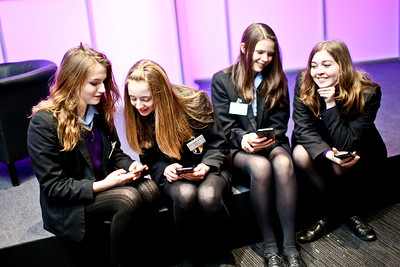Finding the best ways to encourage young women to study Computer Science

We know that the tech sector is not inclusive enough, and unfortunately, many young women do not see computing-related subjects as an option for their future career. We're doing everything we can to change that, to ensure that the industry is open to everyone and that it works to solve society’s biggest problems.
Tackling diversity in STEM education has always been core to our mission. Our student cohort has maintained a gender balance of close to 50/50 since 2010. We were awarded a multi-year £1.2m National Lottery Community Fund grant to reach those young people traditionally excluded from technology, including girls and those in remote and deprived communities, along with a multi-year Comic Relief grant to challenge sexism in the digital sector through promoting female role models and engaging girls to pursue technology careers.
Gender Balance in Computing
The Gender Balance in Computing (GBIC) research programme is a groundbreaking research programme to find out what works to encourage girls to develop an interest during their primary and secondary school years, and increase the number of young women who choose to study Computer Science at GCSE and A level.
GBIC is a collaboration between the Raspberry Pi Foundation; STEM Learning; BCS, The Chartered Institute for IT; the Behavioural Insights Team, Apps for Good and WISE.
Introducing the interventions
The GBIC programme consists of six different research interventions delivered across four years in over 1000 state schools in England.
The different interventions in this programme are related to:
- Belonging
- Storytelling
- Teaching Approach
- Relevance
- Non-formal learning
We’re proud to be contributing to the Belonging, Relevance and Non-formal Learning interventions, by sharing our knowledge and experience, creating course content and resources for the schools to deliver, and supporting the recruitment of both schools and industry experts.
The Belonging project aims to increase girls’ sense of belonging in computing. We have helped to recruit inspirational female industry experts to support the delivery of this intervention.
In the Non-formal learning intervention, we seek to strengthen the links between non-formal learning and studying computing at GCSE or A level. This is because girls are often unaware that their non-formal learning about computing can help them in formal studies. We have created specific resources for schools running the Apps for Good programme which signpost the links between non-formal and formal learning of computing, and how these can lead to future career/subject choices later in the participants’ lives. Schools will be asked to use either the adapted resources or regular Apps for Good resources for 12 sessions.
The Relevance intervention aims to help learners to see the real-world applications of learning computing. We will support schools to engage pupils by helping them to solve real-world problems through technology while studying the computing curriculum. Apps for Good and the Raspberry Pi Foundation have developed a free online training course and 12 hours of lessons to deliver with Year 8 pupils which we will ask some schools to use. These resources are based on existing research which suggests that girls value the opportunity to use computing in real-word applications.
You can find more details about the individual interventions here. Keep an eye out for future blog posts sharing our findings from the research.